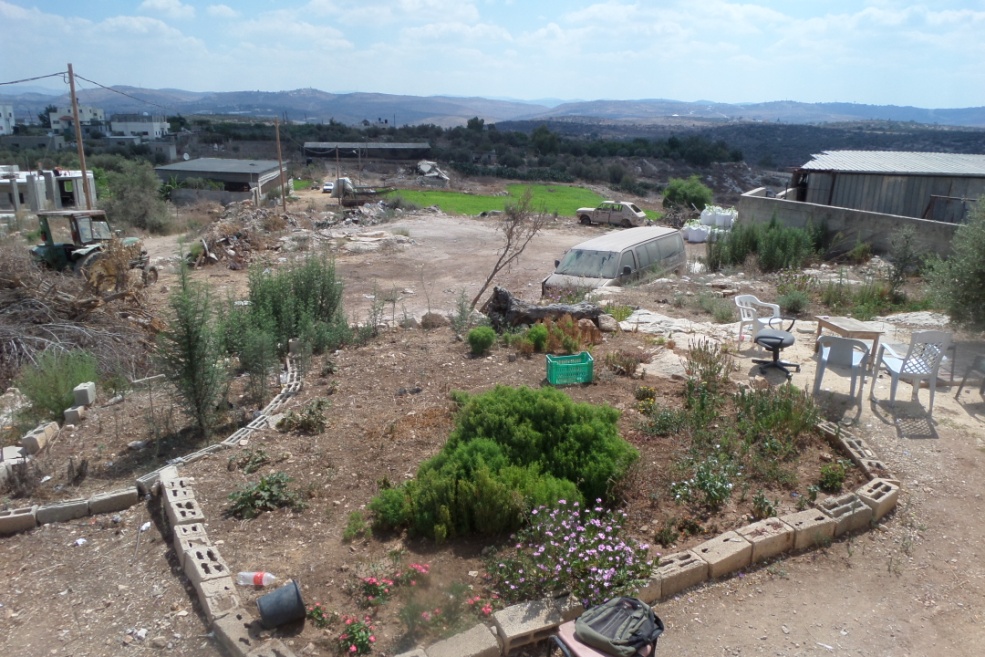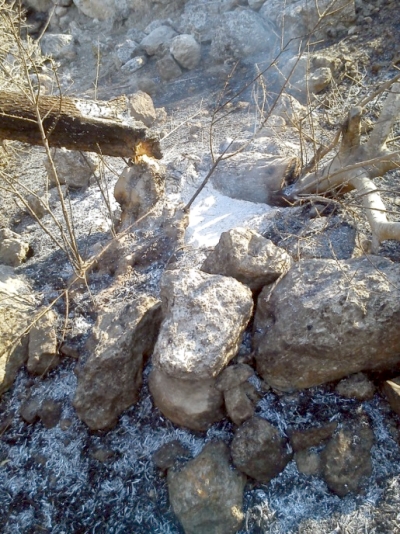Far'un

Two days ago we heard from S. that a large fire broke out in two fields belonging to residents of Far’oun. Fire trucks that arrived didn’t extinguish it. There’s considerable damage. We came to speak to them and to photograph.
‘Azzun
Our first stop, to unload parcels for Z’s shop. His condition has worsened. He’s scheduled for surgery at Hadassah.
We continue north through the West Bank to Far’oun. We’re amazed, as usual, by the way Palestinians treat us. A taxi driver volunteers to drive ahead of us to show the way, phones S., goes to pick him up, brings him to where we arranged to meet. We Israelis have much to learn from them.
The two fires that started two days ago:
- South of Jabara checkpoint (between seasonal gate 746 and the checkpoint). S. owns 12 dunums. Far’oun residents have 600 dunums with almond and olive groves.
- Alongside the old Jabara road, south of the checkpoint (in Area C). That area contains 80 dunums of olive groves.
On Sunday, 4.9.16, at about 9 AM, Palestinians working in the vegetable fields watched a military jeep stop. They saw two soldiers get out, start a fire, return to the jeep, and continue on their way. No-one had a smartphone with which to photograph the event.
Friends of S. also saw the jeep there but not the arson. The fire broke out exactly at that location.
He says there are two cameras in the area, installed by the army, one at Sal’it and the second at Avnei Hefetz, and if the army is really interested in investigating what happened, the arson will be visible on one or both of the cameras. The workers are willing to testify.

S.’s field is a five-minute walk from here, but he must go through Checkpoint 708 and walk for more than an hour to reach it. The damn fence.

.


A Palestinian fire truck arrived but wasn’t allowed to enter the area through Jabara checkpoint.
An Israeli fire truck arrived (I called the Kfar Saba fire department) but wasn’t willing to drive over a 7-cm-high curb. That’s the only way to reach the grove. That’s how the electric company, tractors, carts, practically everyone gets there. But not the fire department. They remained on the road to ensure that the fire won’t reach it and, God forbid, damage Israeli vehicles. Why should they care about Palestinian areas?
Trees were burned on an area of 120-150 dunums. It will take ten years for the trees to bear the same amount of olives. They will give no fruit for three years. It’s difficult to estimate the damage, but it’s great.
A complaint was filed with Yesh Din.

Additional reports from the field: Last week the army entered the Nur a-Shams refugee camp (3 km. east of Tulkarm) at midnight. The soldiers, as usual, destroyed, broke, shattered and also cursed (“I’ll fuck them”), handcuffed the men, took them away, and released them at the Far’oun checkpoint (708). They wounded one man who’s a diabetic, and abandoned him, bleeding. All the crossing permits of the siblings of the man they were seeking were confiscated, and since then no one in the family has been able to work their land.
Far’oun Gate 708 opens three times a week, only in the morning and evening. A Palestinian who works in the field for 3 to 5 hours must wait until 16:00 for the gate to open. The soldiers with the key are habitually late with various excuses, and the Palestinians wait for hours, in the heat or the cold, without shelter. N., the crossings officer, usually receives false reports from the soldiers in the field (I flood him with WhatsApp messages with current information that I receive from the field).
They’re allowed through the gate only on tractors and carts. People on foot must use the Irtach checkpoint. But often they have heavy tools – for reaping, spraying, pruning, digging, etc. – and no tractor or donkey cart. In such cases they’re unable to go through at Far’oun or at Irtach. And then I start phoning the DCL, requesting, pleading. There’s no point in looking for the occupation’s logic. Decisions are completely arbitrary.
